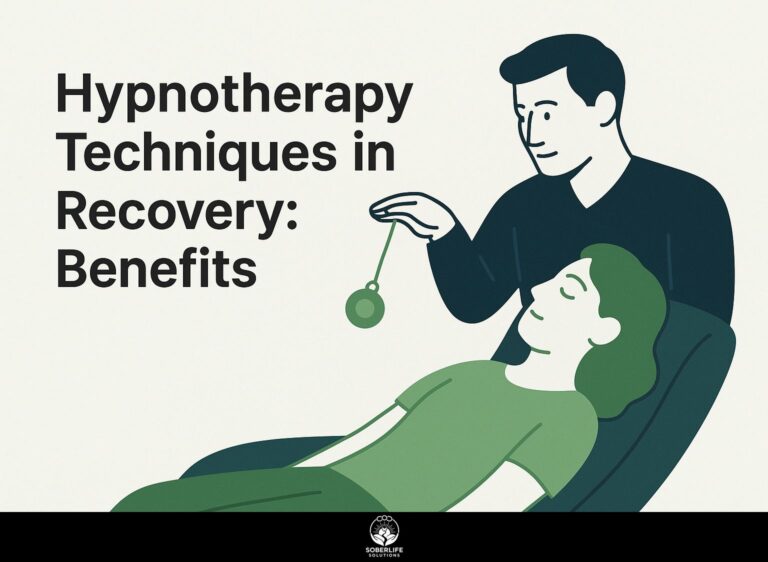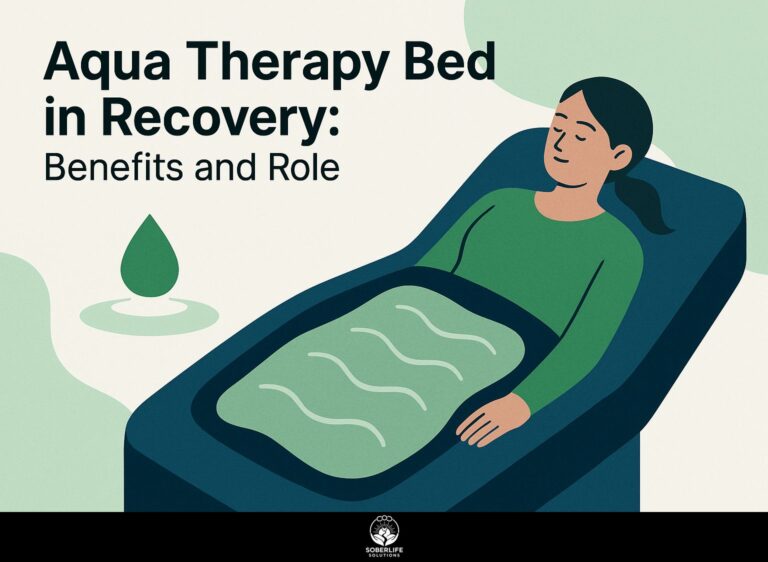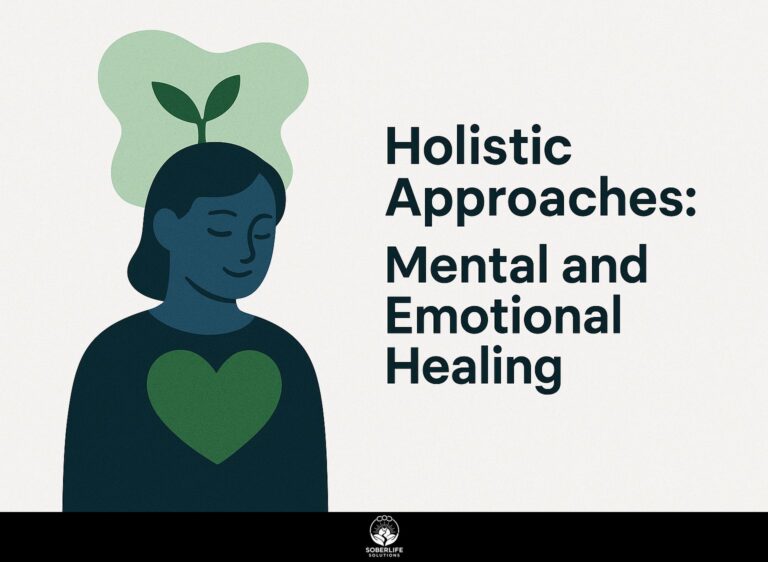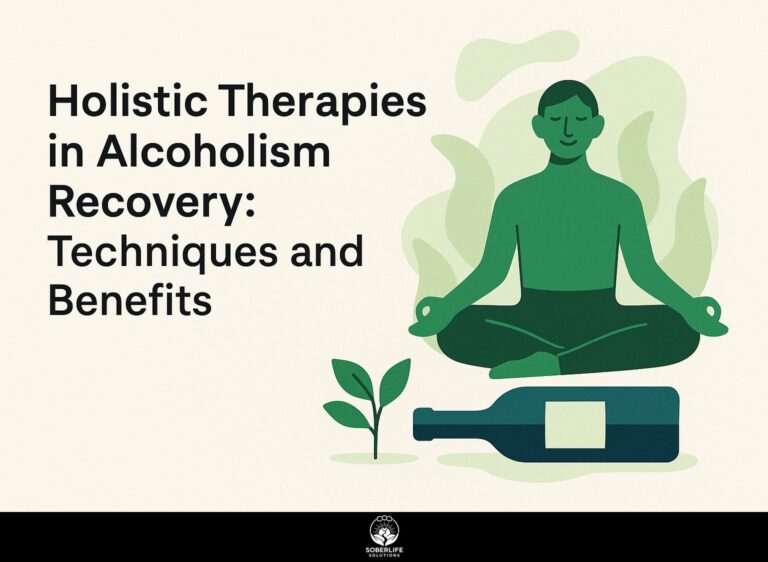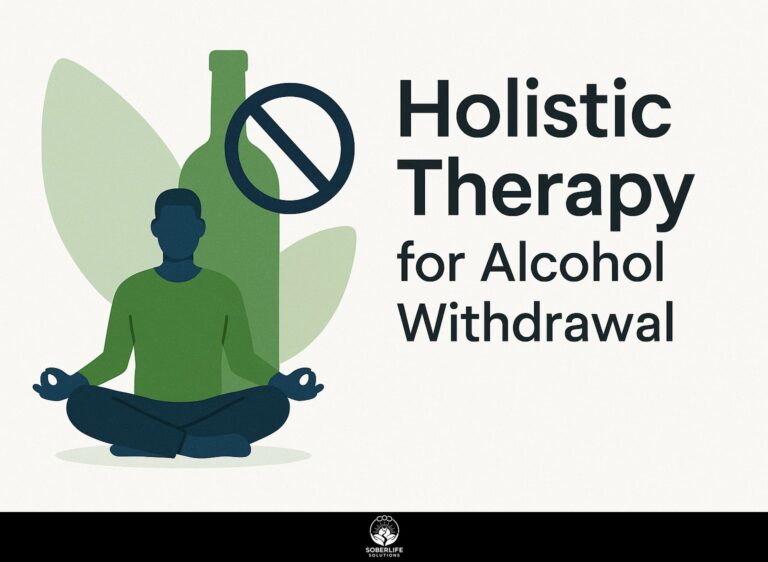Therapies for Alcoholism: Techniques, Benefits, and Recovery
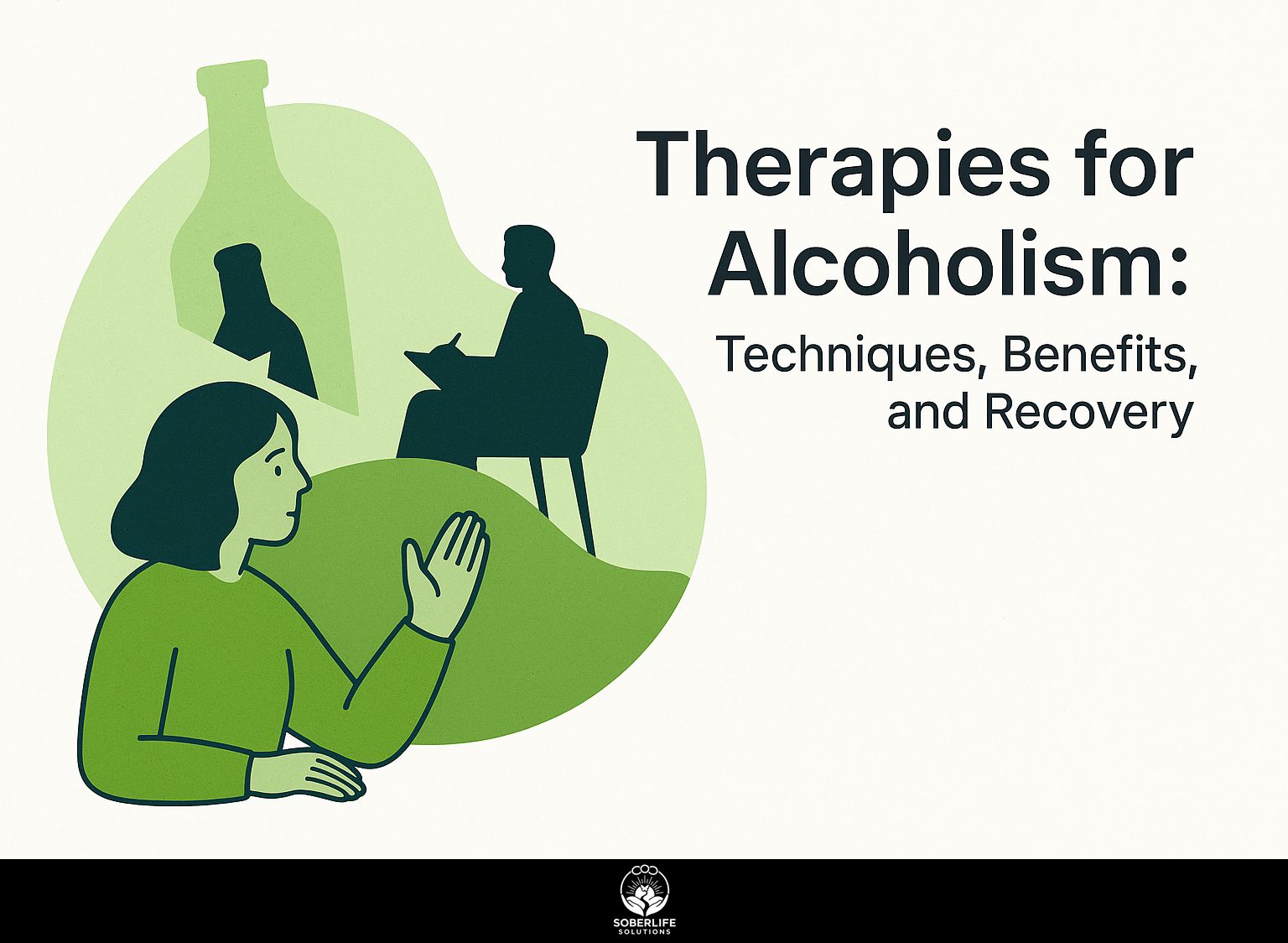
Struggling with alcohol use disorder (AUD) can be even more challenging when paired with conditions like post-traumatic stress disorder (PTSD). Integrated treatment approaches, including cognitive behavioral therapy and behavioral interventions, offer hope for those facing comorbid AUD. This article looks at different therapies, pointing out their advantages and methods to help with recovery. Learn how these therapies can help people take back control of their lives from addiction.
Key Takeaways:
Understanding Therapies for Alcoholism
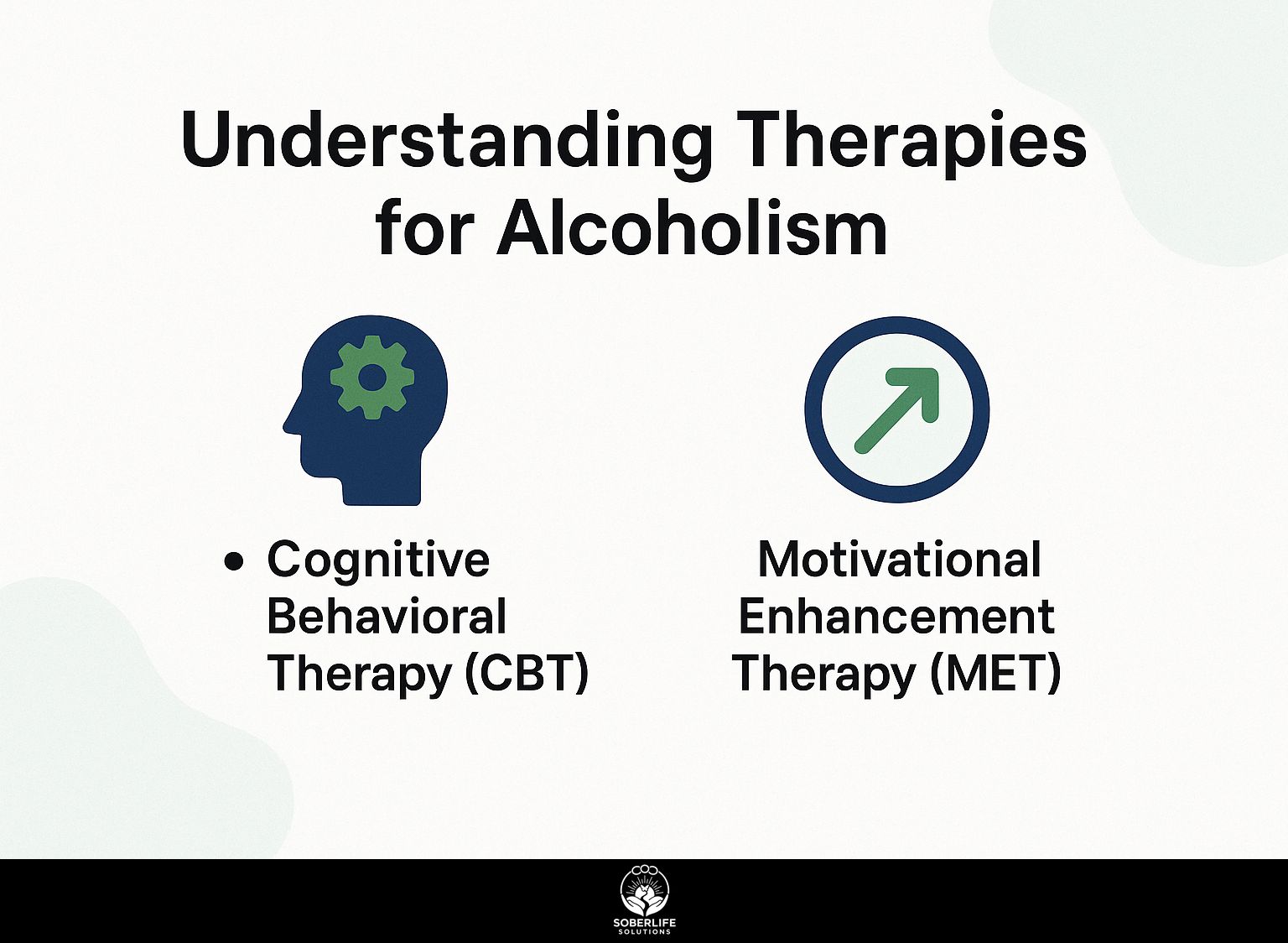
Effective treatment for alcohol use disorder often involves a mix of therapies customized to fit each person’s needs, including both behavioral and psychological approaches. For those seeking to enhance their recovery journey, exploring holistic therapies can be a hidden gem that provides additional techniques and benefits for long-term success.
Cognitive Behavioral Therapy (CBT)
Cognitive Behavioral Therapy (CBT) is a structured, short-term treatment approach that has shown effectiveness in helping individuals manage alcohol cravings and prevent relapse.
CBT focuses on identifying and reshaping negative thought patterns related to alcohol use. Therapists use methods like cognitive restructuring to help patients question and change their unrealistic beliefs about drinking.
Another method, role-playing, allows people to try out coping strategies in real-life situations. Studies indicate a 40% success rate in reducing relapse among those who engage in CBT, highlighting its potential. According to a recent meta-review published by Cambridge University Press, CBT is effective across various conditions and contexts, supporting its broad applicability.
For example, a 2018 research trial demonstrated that participants who underwent CBT reported a significant decrease in cravings and drinking frequency after just 12 sessions.
Motivational Enhancement Therapy (MET)
Motivational Enhancement Therapy (MET) is a person-focused approach that helps people become more motivated to stop or cut down on drinking. It does this through supportive counseling methods.
- Engaging the client to build rapport.
- Focusing on specific goals related to change.
- Evoking the client’s motivations and concerns about substance use.
- Planning actionable steps for behavior change.
Research shows that utilizing MET can increase treatment engagement by up to 70%. Using methods from Motivational Interviewing, like asking open-ended questions and practicing reflective listening, helps therapists build a supportive setting, encouraging a stronger desire for change. Additionally, developing self-awareness plays a crucial role in enhancing these therapeutic outcomes, as mentioned in our analysis of Developing Self-Awareness in Addiction Recovery. For those interested in the structured process of motivational interviewing, an insightful article by the BMJ outlines the four key stages that can effectively guide therapists in this practice.
Medication-Assisted Treatment
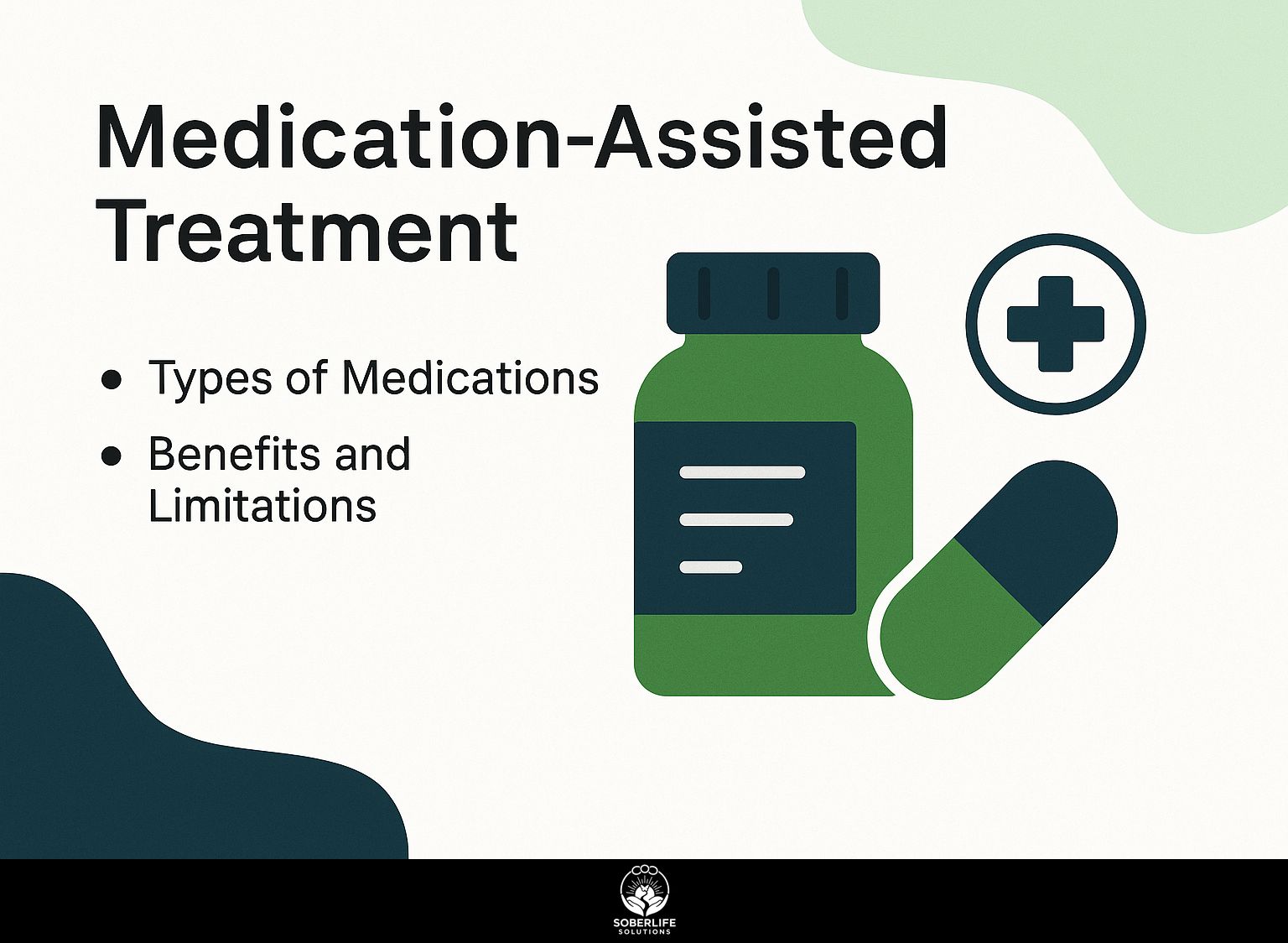
Medication-Assisted Treatment (MAT) plays a key role in helping many people overcome alcohol use disorder through the use of FDA-approved medications.
Types of Medications
There are three main drugs approved for treating alcohol use disorder: Disulfiram, Naltrexone, and Acamprosate, each with a specific role in the recovery process.
Disulfiram helps prevent alcohol use by causing bad reactions if someone drinks alcohol. It’s for people who are very determined to stop drinking.
Naltrexone helps reduce cravings by blocking the euphoric effects of alcohol, ideal for patients looking to cut down on drinking without complete abstinence.
Acamprosate works on the brain’s chemical balance to support abstinence and is often used in conjunction with counseling.
According to the American Academy of Family Physicians, a healthcare provider can recommend the most appropriate medication based on individual treatment goals and past alcohol use patterns.
Benefits and Limitations
While MAT offers significant benefits in reducing cravings and risk of relapse, it also presents certain limitations that must be carefully considered.
Medication-Helped Treatment (MAT) reduces the urge to use drugs and keeps people in treatment programs for a longer time, which often leads to better chances of recovery.
For example, programs that use MAT have a 70% success rate in stopping relapse. Challenges such as potential side effects, social stigma, and costs-which can average around $200 per month-are important to weigh.
A successful case study from a city MAT initiative revealed that participants who engaged fully and received counseling alongside medication achieved lasting sobriety, underscoring MAT’s effectiveness when combined with supportive services.
Support Groups and Peer Support
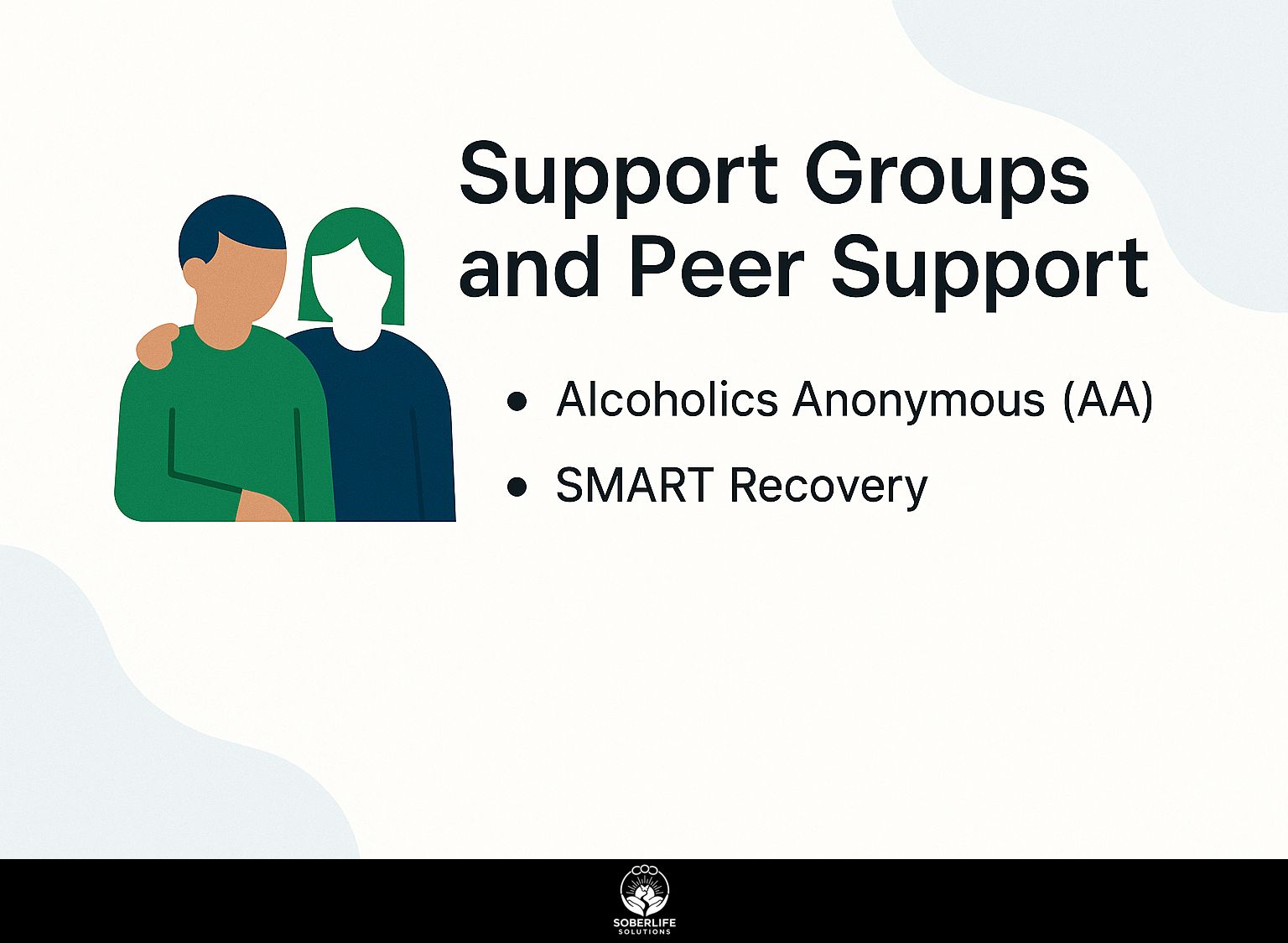
Peer support and being part of support groups are very important in building community and responsibility among people recovering from alcohol addiction. To understand the various benefits and formats, particularly gender-specific options, explore our in-depth article on Gender-Specific Alcohol Support Groups.
Alcoholics Anonymous (AA)
Alcoholics Anonymous (AA) is a widely recognized support group that employs a twelve-step facilitation approach to encourage recovery through community and shared experiences.
The twelve steps of AA focus on self-reflection, acceptance, and spiritual growth.
Members are encouraged to acknowledge they can’t control their drinking, apologize for past errors, and look for help from a higher power. Research indicates that participants in AA have a 5-10% higher likelihood of achieving sobriety than non-participants.
Many individuals, like John, who attended weekly meetings, credit the support and accountability found in AA for their recovery success. As he puts it, “AA gave me not just support, but a new lease on life.”
SMART Recovery
SMART Recovery offers an alternative to traditional support groups. It emphasizes self-reliance and uses methods based on scientific research, such as contingency management.
SMART Recovery uses cognitive-behavioral techniques to increase personal motivation. In contrast, Alcoholics Anonymous (AA) emphasizes a spiritual approach and sees addiction as something uncontrollable.
The 4-Point Program helps people increase motivation, manage cravings, manage their thoughts and actions, and live a balanced life.
Research indicates that people in SMART Recovery reduce their alcohol consumption by 60%, demonstrating it is effective. Tools like self-assessment worksheets and online meetings also help members in their recovery process.
Holistic and Alternative Therapies
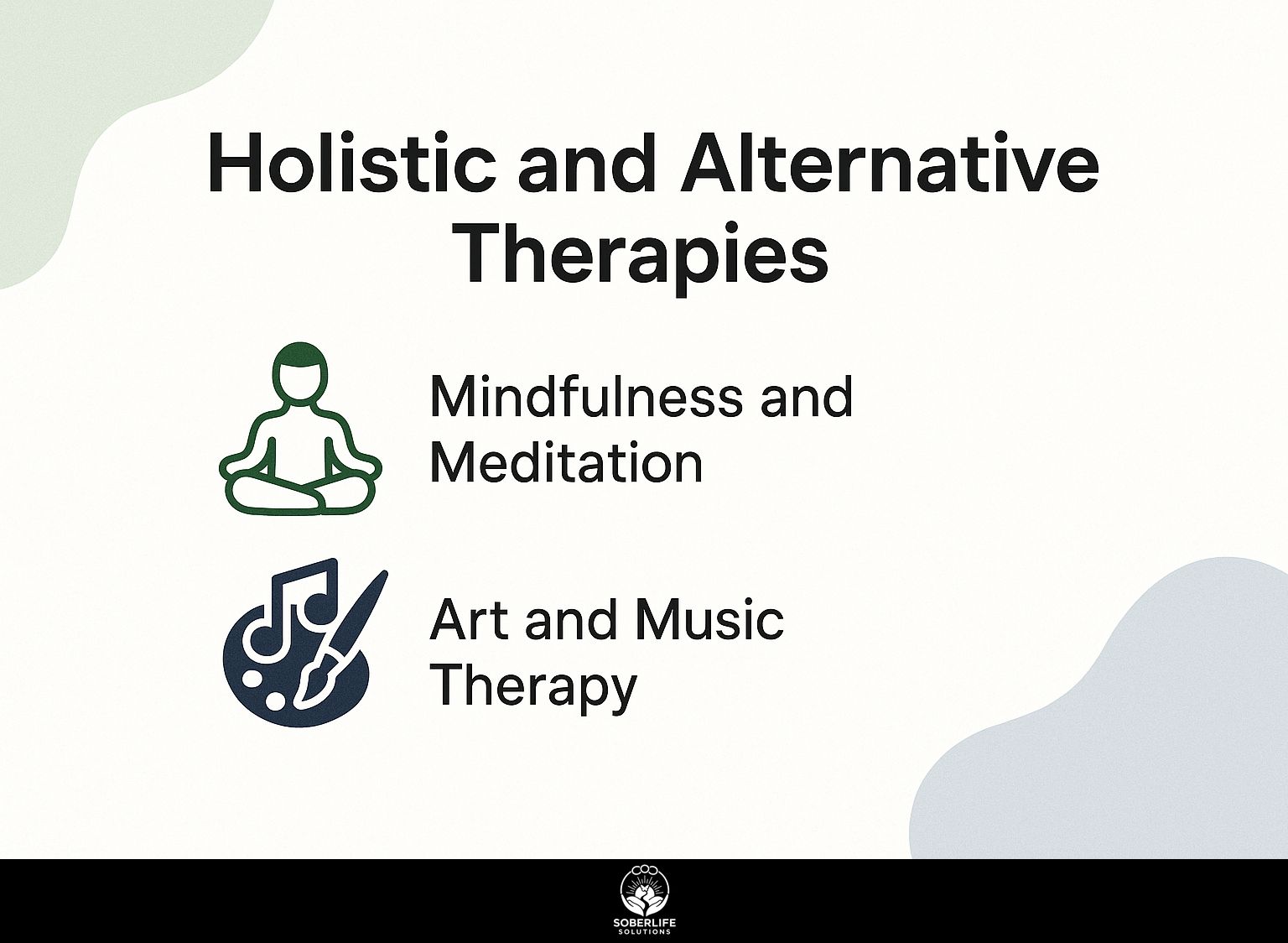
Using complete treatments and other therapeutic methods can help people recovering from alcohol addiction by focusing on their emotional and mental well-being.
Mindfulness and Meditation
Mindfulness and meditation practices have gained recognition as effective tools for managing cravings and stress among individuals in recovery from alcohol use disorder.
Research indicates that incorporating mindfulness can reduce relapse rates by up to 30%. For practical implementation, individuals can start with simple techniques like body scans or mindfulness breathing exercises, which involve focusing on one’s breath for a few minutes daily.
Meditation apps such as Headspace or Insight Timer offer structured sessions to assist beginners in concentrating on particular healing subjects.
Creating a daily habit, even for just 10 minutes, can greatly improve emotional strength and lower stress levels.
Art and Music Therapy
Art and music therapy provide creative outlets for individuals in recovery, helping them express emotions and process experiences related to their alcohol use.
Both therapies use particular techniques that can greatly improve emotional health.
For instance, art therapy may involve painting, which allows individuals to visualize and externalize their feelings. Similarly, songwriting can serve as a powerful tool in music therapy, enabling participants to articulate their experiences through lyrics and melody.
Studies show that engaging in art therapy can reduce anxiety levels by up to 50%, providing a measurable benefit for those coping with recovery challenges. By encouraging creativity, these treatments help with healing and personal development.
Evaluating the Effectiveness of Therapies
Checking how well different treatments work for alcohol use disorder is important for creating personal plans that improve the likelihood of recovery.
Key metrics for assessing therapy effectiveness include sobriety rates, relapse rates, and patient satisfaction surveys.
For instance, randomised controlled trials showed that cognitive-behavioral therapy (CBT) resulted in 60% sobriety rates after one year, while motivational interviewing (MI) had a 50% success rate.
Patient satisfaction surveys reveal that those engaged in group therapies often report higher satisfaction levels due to community support.
By analyzing these metrics, healthcare professionals can identify which therapeutic approaches are most aligned with an individual’s recovery goals.
Steps Towards Recovery
Following a clear plan for recovery can greatly increase the chances of staying sober in the long run for people struggling with alcohol addiction.
To begin recovering successfully, reach out to a licensed therapist or join a nearby support group. Establish a strong support network by connecting with other individuals in recovery through meetings or online forums. Develop coping strategies, such as mindfulness or journaling, to manage triggers.
- Weeks 1-2 for professional assessment;
- Weeks 3-4 to establish your support network;
- Ongoing practice of coping strategies to reinforce new habits.
Frequently Asked Questions
What are some common techniques used in therapies for alcoholism?
Some common techniques used in therapies for alcoholism include cognitive behavioral therapy, motivational interviewing, and group therapy.
What are the benefits of participating in therapies for alcoholism?
The benefits of participating in therapies for alcoholism include learning coping mechanisms, improving mental and emotional well-being, and developing a support network.
How does therapy aid in the recovery process for alcoholism?
Therapy can help people overcome alcoholism by dealing with hidden problems, finding what causes urges to drink, and making a treatment plan that fits the individual for lasting recovery.
Are there any alternative therapies for alcoholism?
Yes, alternative therapies such as art therapy, equine therapy, and yoga have been shown to be effective in treating alcoholism and can be used in conjunction with traditional therapies.
Can one type of therapy be more effective than others in treating alcoholism?
The effectiveness of a therapy for alcoholism can vary from person to person. It is important to find a therapy or combination of therapies that work best for each individual’s specific needs and goals.
What role do support groups play in the recovery process for alcoholism?
Support groups, like Alcoholics Anonymous, can offer a sense of community and empathy for people dealing with alcoholism. They can also offer ongoing support and guidance in maintaining sobriety.

